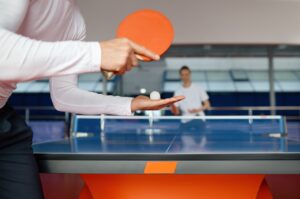“Confidence is the most important thing in this sport, and the confidence from winning Wimbledon would make it easier to win the Olympics, too. Either would be very difficult, both even more-but the player who wins Wimbledon will be the favorite for the Olympics. It can happen.”
– Rafael Nadal
Many athletes greatly underestimate the role of mental preparation in tennis. Of course, knowing the tactics and being in good physical shape is very important. However, you lose on the court if you lose in your head. Therefore, in order not to let the next set slip through your fingers like grains of sand, you must first become a champion in your mind.
Today, we will examine the most popular practices used by top tennis players worldwide and learn how to use them to become the best version of yourself.
Best Mental Practices
Elite tennis players understand that their mental approach can significantly impact their performance. To prepare for matches, they engage in mental and physical routines designed to establish a state of readiness and calm. Visualization plays a crucial role in their preparation. Tennis players often imagine themselves executing successful shots and strategies, which helps build confidence and reduce game-day anxiety. This mental rehearsal makes them feel prepared for every possible scenario on the court.
Additionally, techniques such as deep breathing or meditation are commonly utilized to manage stress and enhance focus before and during matches. These practices help calm the mind and reduce the physiological symptoms of stress, allowing tennis players to maintain a clear focus on their game strategy without being overwhelmed by their surroundings or the stakes of the match.
During the game, maintaining concentration is crucial for success. Tennis players employ positive self-talk to boost their confidence and manage doubts that may arise during play. This internal encouragement helps to reinforce their abilities and keeps their mindset positive, even during challenging moments. Furthermore, staying present and focusing on the task at hand is essential. Tennis players strive to remain mentally in the moment, not allowing past points or anticipating future outcomes to disrupt their concentration. This focus is vital in managing the pressure that comes with competitive play.
Post-match reflection is integral to developing mental toughness and overall game strategy. After each match, players critically analyze their performance to understand the effective strategies and aspects that need improvement. They ask themselves several reflective questions to guide their analysis and learning:
- What strategies worked well, and why?
- What aspects of my game can be improved for better results?
- How can I better handle pressure in future matches to maintain optimal performance?
Be the Champion!
Mastering the mental game involves more than just practice on the court. It requires a commitment to developing mental resilience and focus. By emulating the mental preparation, in-game tactics, and post-game analyses that elite players practice, you can significantly enhance your own tennis performance. This process helps tennis players achieve greater focus, resilience, and confidence at all levels, contributing to better performance and enjoyment of the game.
